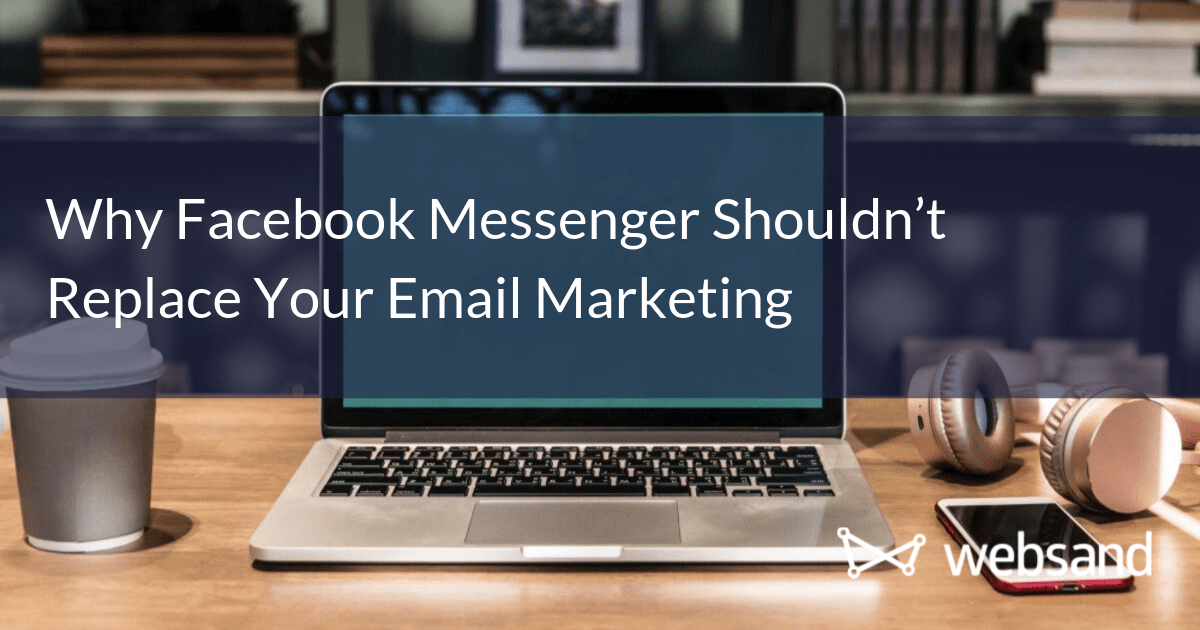Why Facebook Messenger isn’t a replacement for Email Marketing
You may have heard gurus advocating for brands to use Facebook Messenger for talking to customers. Many of them throw around pretty impressive statistics.
Why wouldn’t you want 88% open rates on your messages? Or 56% click-through rates?
And you can use messenger-based marketing much like email. Add subscribers to message sequences. Send them resources or downloads over the Facebook messaging app. Even set up a sales funnel that guides them through messenger, rather than a series of emails.
Only 2 in 10 consumers think brands are communicating well. So, if we’re still using email and 8 in 10 think that’s not right…?
As an email marketing platform, we had to investigate. Should brands swap their email efforts for Facebook Messenger?
Why would you use messenger bots for marketing?
The common advice is to go where your audience is. If you want to target millennials or younger consumers? Use a platform they’re familiar with. Which in most cases is Facebook Messenger.
Florist 1-800 Flowers started offering purchases through Messenger. They attracted tens of thousands of users in just two months. The brand offers a buying process like the experience you’d get in a store. Only it’s online.
Adidas work with influencers across apps like WhatsApp and Facebook Messenger. They don’t use bots because the Adidas teams chat to the influencers themselves. They glean insights about trends and customer bases. Many marketers think talking to customers one-to-one helps them personally connect to your brand.
BuzzFeed pushes content to subscribers on WeChat. It’s personalised to those subscribers too. Subscribers can even ‘reply’ with keywords to get specific content.
Both H&M and Sephora let users subscribe through Kik. Their bots ask questions to isolate a customer’s preferences. Then they provide recommendations or reviews. And direct users to a ‘buy now’ page.

Bots are a great way to find out about your customers. You can glean insights about what they like through their responses. Which is helpful when you’re starting out and have little customer data. Or you’re not sure if the audience you’ve built is the one you wanted.
But here’s the thing.
If you use data-driven marketing, you can do the same thing through your emails. You’ve got a wealth of data around what they buy, how much they spend, and when they shop. The customers gave you this data. You didn’t need to interrupt them on a messaging platform.
What are the disadvantages of using chatbots for marketing?
Not everyone uses Facebook. After the Cambridge Analytica scandal, 1 in 20 Brits deleted their account in protest. And given Facebook owns WhatsApp, not everyone has a WhatsApp account either. You can’t expect customers to sign up for another platform, just to talk to you.
But email? People still have email accounts. And years of online commerce have trained them to check their inbox for useful emails. It’s easier to find an old email than it is finding information in a chat thread. In an inbox, users can file emails in folders or use the ‘search’ function.
You’re also offering a brand experience to your customers from inside someone else’s brand. Whether it’s WhatsApp or Facebook, they control the look and feel of the encounter. Worse still, your encounters can look almost identical to those a competitor offers. Because you’re both working within Facebook branding.
It may feel more like a personal conversation. But it doesn’t reinforce your brand identity.
Does Facebook Messenger have a place in your business?
Yes. It’s an excellent way to provide customer support. The bot can answer simple queries, and hand over more difficult ones to a member of your team.
This kind of response is instant. It helps ease support queries for your team. And customers feel they’re getting answers fast.
Chatbots offer a fantastic opportunity for users to ‘talk’ to your brand. And they do so within a platform they use anyway. Remember, social media is exactly that – social. So, moving the ‘social’ interactions to Facebook Messenger makes sense.
But Messenger shouldn’t replace your email marketing. Emails still provide functions that bots can’t top. There’s the searchability of an inbox. You can archive old newsletters on your website for an SEO boost. And signing up for emails will never grant a brand access to your Facebook profile and data.
So, email still has a place in marketing?
Yes. Email should still lie at the centre of your marketing strategy. There’s only one reason you’d obsess about open rates and click rates. And that’s if you send ‘one-size-fits-all’ email blasts.
But you’re reading this blog. You know all about the Power Twins of Email Marketing – Automation and Segmentation. If your email list is less about numbers and more about segments? Then your subscribers will open your emails regardless. Because you send the right email for them, at the right time.
Even customers who hate using email enjoy getting emails they need.
You can control how your email looks, stamping your brand onto messages to your customers. Rather than intruding into a customer’s world, you can invite them into yours.
And there’s another issue.
Marketing supremo Neil Patel advises brands to adopt Facebook Messenger now. Get in before customers get sick of messenger bots. Getting messages from brands on the platform is exciting. It’s still a novel experience.
And that may be true. For now. But relying on a single social media platform for your marketing is a dangerous game. What happens if that platform goes away? Or they change their terms of service? Their algorithms?
You’re building your house on wobbly foundations.
Besides, what will you do when customers get sick of branded messages on Facebook (which they will)? When messaging fatigue sets in, you’ll have to find a new way to contact your customers.
Think long-term gains, not short-term wins
Your business needs a marketing strategy, not tactics. Tactics might help you win a battle or two, but they won’t help you win a war.
Mastering email marketing offers a strategy to succeed in e-commerce. Messenger bots are only a tactic that may, or may not, last very long.
By all means, add them to your marketing arsenal for customer engagement and support. But don’t think they can replace your email efforts.
Are you wondering how to power up your email marketing for Messenger-like results? Get in touch with us today and we’ll get you started.
It’s time to start getting more from your email marketing
Sign up for a free Websand demo and let’s show you how to get the best from your email marketing.
